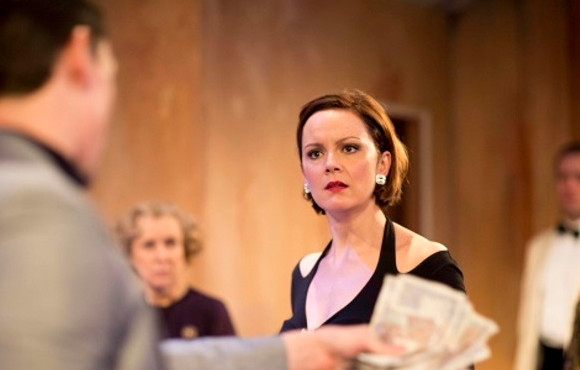Variation on a Theme (Finborough)

© Helen Maybanks
Terence Rattigan‘s 1958 play was seen by an 18 year-old Shelagh Delaney in Manchester on its pre-West End tour and she loathed it so much that she went home and wrote A Taste of Honey, now superbly revived at the National.
So Variation on a Theme – a South of France romantic melodrama based on the show’s original star Margaret Leighton’s real-life infatuation with the much younger, bisexual Laurence Harvey (played on stage by Jeremy Brett) – inadvertently kick-started a modern classic which, ironically enough, some now find as dated as Rattigan’s play struck Delaney, and most of the critics, back then.
The Finborough revival’s strongest suit is the casting of Rachael Stirling in the Leighton role of the consumptive, alcoholic Rose Fish, a much-married socialite occupying a grand villa in Cannes; exactly the same age (36) as Leighton was in 1958, she is stylishly dressed, sexily poised, emotionally extravagant, huskily voiced and wholly magnificent.
But, oh dear, the play drags in the second act through a series of changes of heart, changes of clothes and even an extremely boring card game involving an American hanger-on (Emma Amos) and the two men now competing for Rose’s favour: the young ballet dancer Ron Vale (Martin McCreadie), given to wearing tight trousers and standing in second position, who has accosted Rose in the casino, and the ghastly German financier Kurt (Phil Cheadle) who’s a more plausible meal ticket for life, or a few years, at least.
These unattractive contenders are buttressed by Rose’s paid companion, Hettie (Susan Tracy), herself a once wealthy aristocrat reduced to prim mutterings, and Ron’s Svengali, the choreographer Sam (David Shelley), who arrives from Monte Carlo to deliver a pious homily about his asexual, paternalist devotion to the budding ballet star.
Delaney heard only a "dishonest" treatment of homosexuality, but Rattigan’s meaning is clear and deflected through his trademark good manners which shade, anyway, into an authentic ambiguity. She probably also hated Rose’s simpering daughter (Rebecca Birch) going on about existentialism now being as old-fashioned as "angry young men and James Dean-ery."
Rattigan wasn’t going down without a fight and, as with Coward, the air has now cleared to reveal his true qualities. But for him to have a better chance with his secondary plays – and this modern Dame aux Camellias, replete with red roses and snippets of La traviata, is no lost masterpiece – a revival, on or off the fringe, has to have much stronger casting than here.
Only Stirling and Susan Tracy are in the groove, the others looking awkward and sounding far too preciously am-dram. But designer Fotini Dimou has somehow evoked the magical coastline and organised some fine costumes, even though the choreographer seems not to know how to tie a cravat, or indeed comb his hair, an unlikely fashion faux pas.
Appearances are important and deceptive in a play where the main joke is that Rose and Ron are both coincidentally in flight from grim post-war Birmingham, she as a femme fatale with a preference for wealth over Welfare, he as a "Russian" gigolo with a cunning, leech-like propensity for seeking out love.
A Taste of Honey continues at the Finborough until 22 March 2014










